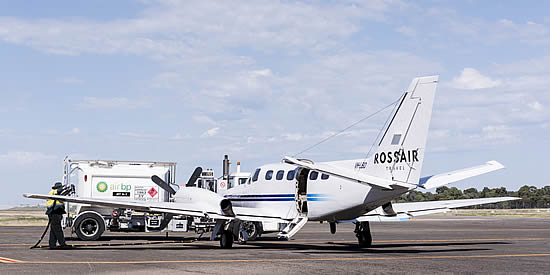How Air BP’s operations became carbon neutral
Climate change is one of the most challenging issues of our time. The last couple of years have seen stakeholders across the industry turn their attention to tackling the issue of climate change.
Electric planes, solar powered aircraft and fuel produced from used cooking oil and other waste, called sustainable aviation fuel, are no longer pipedreams. They point to the future of aviation. But while these exciting innovations and pioneering initiatives are to be applauded, they are still not operated or available at scale. So, the question we should really be asking is, what does the transition to a lower carbon future look like in the interim?
Air BP’s commitment to developing better, cleaner more sustainable aviation fuel is nothing new. For over a decade we’ve been enabling ground-breaking test flights; we first supplied sustainable aviation fuel (SAF) in 2010 to the Brazilian airline TAM (now LATAM). And we’re also investing in sustainable alternatives. Now we’re among those leading the way to a more sustainable future with sustainable aviation fuel that recycles used cooking oils and - in the future, household waste - to cut carbon emissions by up to 80% over its lifecycle.
Carbon neutral operations
I would like to explore how we are balancing the challenge of satisfying customer demand and business needs with achieving carbon neutrality.
One of the company’s recent highlights has been to achieve carbon neutrality (in 2016) across our global network of more than 250 Air BP operated into-plane sites. It demonstrates how the business is not only investing but has been acting for years to tackle climate change.
The emphasis of the Air BP Carbon Neutral programme right from the start has always been to first establish a reduction plan for our operations. Only after this do we offset emissions that remain. This has been the basis of the carbon management framework since 2014.
The initial challenge we faced was coming up with the methodology and framework to quantify our carbon footprint. Every location is different. We needed to consider the different geographies and understand our overall footprint.
The second challenge was to look at how we could reduce our direct and indirect emissions to achieve more energy efficiency in our operations. No two locations are the same so there’s no ‘one size fits all’ model that can be applied. Working closely with our operations team and airports was, and still is, vital in developing innovative solutions to reduce our carbon footprint.
For example, when it comes to energy consumption, we’ll only pump what is needed. We also use alternative energy for our trucks. We have over a decade of experience of using electric powered vehicles which significantly reduce emissions. Our vision is to have zero emission trucks in our fleet.
We have also adopted stop-start technology in our hydrant dispensers. The clever thing about this technology is that it constantly monitors power demands and reduces the length of time the engine is running during refuelling.
From fuel efficient vehicles to innovative technologies, here are some of the key initiatives we’ve used to achieve carbon neutrality across our global network of Air BP operated locations.
-
Taking trucks off the road. Reducing the number of journeys made by truck brings down emissions. For example, by upgrading fuel infrastructure at Air BP’s Dolvik terminal to enable delivery of Jet A-1 via pipeline to Norway’s second largest airport at Bergen, it has resulted in a more efficient, lower carbon fuel supply for customers. This change is saving 270 tonnes of carbon emissions annually. Bergen airport serves more than six million passengers a year.
-
Stop-start technology on aviation fuel hydrant dispensers to minimise emissions. With the engine shut off for refuelling, power demands are constantly monitored and automatically switched on to ensure enough power to support high power demand activities such as platform lift, inlet hose lifts, interlock system and lighting. This reduces carbon emissions and fuel consumption.
-
Electric powered vehicles have been in use at Air BP operations for more than 10 years. They offer a 100% reduction in carbon dioxide emissions at airport level, deliver less fuel costs than a diesel engine. And, what’s more, the lead, plastic and acid can be recycled at the end of the battery life.
-
Magna-Strain is an in-line magnetic filter, which strips out magnetic materials like rust particles within pipelines. This helps with waste reduction as it replaces traditional paper filtration. The removal of the rust particles helps the pumps and other equipment downstream to operate more efficiently with a reduction in maintenance and ultimate replacement.
Call for collaboration
Climate change is a global concern and tackling it requires long-term collaboration from everyone. Business, government and society are beginning to take action and we’re seeing more and more examples of this.
Take the Nordic countries - they are leading the way towards sustainable air travel because people at every level are engaged, including governments, industry and the general public. We’re exploring how we can keep the industry aware of the latest developments in carbon neutrality. This is something we’re also working closely on with the Australian government for its National Carbon Offset Standard (NCOS).

Air BP carbon neutral operations
We partner with airlines and airports to work with BP’s dedicated carbon offsetting team - BP Target Neutral. This is a voluntary programme to help our customers offset their carbon emissions. As part of BP, together, we have offset more than five million tonnes of CO₂. BP Target Neutral carefully select offset projects from around the globe; each has to meet a rigorous list of requirements and are independently verified. These programme are also benefitting local communities and changing lives.
We’re often asked what the future holds for the aviation industry’s wider carbon neutral goals. Moving away from vehicles and aircraft powered solely by fossil fuels is a major focus. Our sustainable aviation fuel plays a role in efforts to help to reduce an aircraft or airline’s carbon emission levels. It can be produced from waste such as used cooking oil to cut carbon emissions by up to 80% over the lifecycle of the fuel. We have already established supply chains and to date have supplied SAF to 16 airports worldwide and counting. We’re working with leading SAF producers and developers like Neste and Fulcrum BioEnergy to meet our customers’ needs by purchasing, blending and supplying SAF. We are also looking at opportunities to use biofuels for our fleet of ground vehicles. But looking ahead, we’re keen to work with airline operators and manufacturers to gain a better understanding of how the electrification of aircraft could affect airport infrastructure and ground handling services.
Both governments and industry associations globally are making commitments to a more sustainable aviation future. It’s clear that collaboration will be key to how successful we are as an industry in achieving these goals. So, while Air BP is playing a part in leading the way to a more sustainable future, we’re doing so alongside other partners and stakeholders with a shared vision. Integral to the role we play is our ability to really listen to what customers need and want and to try to ensure we deliver that in the most sustainable way possible.
| © BlueSky Business Aviation News Ltd 2008-2020 |



